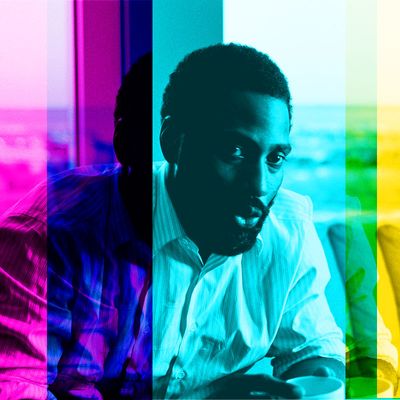
Usually, this column is devoted to lines that have bounced around in my head for a certain period of time. I spent years as a Closer warrior on Tumblr, blogging and reblogging GIFs of Natalie Portman saying indignant and impressive things. “You shouldn’t be upset that I fucked her, you should be upset that I had a laugh with her!” was a line so perfectly backwards that it camped out in my brain for many months before I even thought it was something worth taking seriously. But today’s line reading is from Tenet. I saw this movie a week ago, but one line has evicted every other thought from my head. This Tenet line has manifest destiny’d my mind.
There is not a lot in Tenet to be awed by. For how slick it is — the scenes of genuinely dizzying action, the continent jumping, the way John David Washington’s beard connects — the movie mostly bumbles toward each new mission. A pair of spies rush toward the future (or the past?) to save the world from certain destruction. A maligned wife is held prisoner by her husband. There’s an algorithm — or there isn’t an algorithm, or there’s about to be an algorithm — that is capable of collapsing humankind. (There are also approximately 30 minutes in the second act that are quite a lovely, though joyless, The Thomas Crown Affair remake.) A review from Collider puts it thusly: “In many ways [Tenet] feels like a collection of [Christopher Nolan’s] greatest tricks.” Tenet bundles together so many Nolan obsessions that it botches what made them effective in his previous work.
But there’s something in Tenet that so uncharacteristic for Nolan that it made me gasp inside my mask. The protagonist (John David Washington) needs to infiltrate the orbit of the superrich arms dealer Andrei Sator (Kenneth Branagh), married to Kat (Elizabeth Debicki). For some reason — listen, a lot of this movie’s dialogue is very hard to hear — JDW meets Michael Caine for lunch at an extremely fancy restaurant. Caine is part handler, part adviser; he informs our hero that if he expects to rub shoulders with Sator and his wife, he can’t just be wearing any damn thing. “Brooks Brothers,” Caine says, “is not going to cut it.” Nolan lays their dichotomy on thick: the waiters at the restaurant seem miffed at even the presence of a well-tailored Black American man. When they offer him a menu, it’s like they doubt he will be able to read it. (Normally, I’d call this clear racism on the parts of these characters, but Nolan writes it as anti-American snobbishness.) Caine’s character is part of the gentry, readily admitting that while the British might not have patented snobbery, they have a controlling interest in it.
For all this high-falutin talk, the tony restaurant, the Brooks Brothers drag — RIP! — Washington gets a line that is so devilishy bitchy I’d doubt Nolan wrote it himself (except his kids did compare him to the hilariously fussy Daniel Day-Lewis character in Phantom Thread). To get an audience with Sator, Washington will first have to get an audience with his wife, and she deals in rare art. Caine slides a shopping bag across the table. JDW raises his eyebrows. “You’re carrying a Goya?” he asks, “in a Harrods bag?”
The Goya’s a dupe, but that shade is real. Those two syllables — Har-rods — are fighting for their lives to get out of John David Washington’s mouth! The condescension in that scene — you’d think Harrods just filed for bankruptcy, not Brooks Brothers! What does Nolan have against the London department store? Who hurt him there, or who there hurt him? Harrods might as well be the Trump White House, Orlando during spring break, or Murray Hill on a weekend, the way Tenet casts it. And by that I mean: the worst place on the face of the fucking earth. (Poor Goya, I guess? I’m not sure he deserved this.)
What follows this line are two hours of complicated meaninglessness: people go forward in time and back in time and further back in time — whatever. The only emotional arc goes to Debicki, forced to play a woman who cares more about saving her son than ensuring the rest of the population’s survival. (In one especially memorable (but deeply puzzling) sequence, she’s told that if the mission fails, everyone on Earth will die. “Including my son,” she ponders aloud.) She and JDW aren’t in love, but might have crushes on one another bubbling just below the surface? No one in this movie even gets particularly angry. That glimpse of bitchiness — “You’re carrying a Goya? In a Harrods bag?” — is Blair Waldorf–level. It’s House of Woodcock redux. It’s positively Massie Block. It’s a moment most pleasing to me in Christopher Nolan’s career. It’s a flicker of humanity that does more to tether Tenet to the material world than anything else in the film.
More From This Series
- This One Line From When Harry Met Sally Plays on a Loop in My Head
- This One Line From Gone Baby Gone Plays on a Loop in My Head
- This One Line From Magnolia Plays on a Loop in My Head





